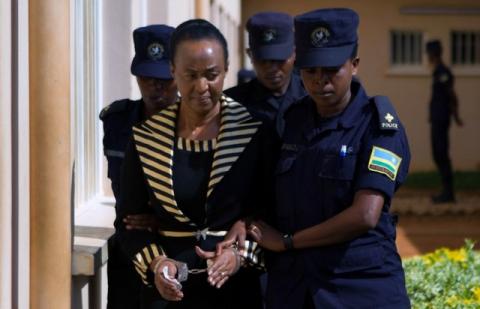Advertisement
Rwandan leader's would-be rival Rwigara and her mother denied bail
KIGALI (Reuters) - A Rwandan court denied bail on Monday to a vocal critic of President Paul Kagame who was barred from running against him in an August election and later jailed on charges of incitement and forgery that are widely seen as politically motivated.
Diane Rwigara and her mother, Adeline, who was also refused bail, said they planned to appeal. Her sister Anne, who is a U.S. citizen, was granted bail.
All three women are charged with inciting insurrection while Diane is also accused of forging the signatures of some people she said backed her run for president. Rwigara has said the charges are intended to silence her family and supporters as punishment for her political ambitions.
Rejecting the bail request, the lead judge on a three-member panel said there was "strong evidence" to prosecute Rwigara.
"Both Diane Rwigara and Adeline Rwigara must be remanded for 30 days," she said.
The 35-year-old accountant has repeatedly accused Kagame of stifling dissent and criticized his Rwandan Patriotic Front's near total grip since it fought its way to power to end a genocide in 1994.
She had planned to run against Kagame in the August poll but her candidacy was blocked by the electoral board on the grounds that she had not submitted enough supporters' signatures and some of the names she did send in belonged to dead people.
Kagame won the election with 98.8 percent of the vote.
Adeline and Anne Rwigara had earlier told the court that they and Diane were tortured and deprived of food while in jail awaiting trial, including being kept in solitary confinement and "handcuffed day and night".
On Friday, a U.N. subcommittee on the prevention of torture suspended a visit to Rwanda, citing obstructions by authorities.
The Rwandan government denied impeding the investigators' work and said the allegations were baseless.
Diane's brother Arioste Rwigara said the bail denial was "absurd" and the charges against his mother and sisters were like those used by "tyrannical governments of the middle ages".
Kagame won international praise for restoring stability in Rwanda and presiding over a rapid economic recovery after the genocide, in which an estimated 800,000 ethnic Tutsis and politically moderate ethnic Hutus were killed.
But human rights groups say he has muzzled independent media and suppressed potential democratic opponents. Some critics of the government have been imprisoned or killed.
(Editing by Elias Biryabarema; Editing by Catherine Evans)



















Add new comment